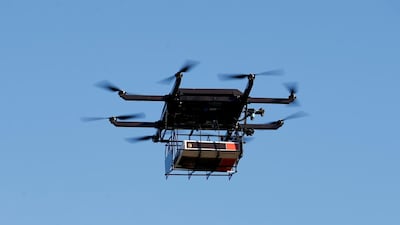Small drones will be allowed to fly over people and at night in the US, the Federal Aviation Administration said on Monday, in a step towards their use for widespread commercial deliveries.
The FAA said its long-awaited rules for the drones will address security concerns by requiring remote technology in most cases to enable their identification from the ground.
The rules will take effect 60 days after publication in the federal register in January.
Drone makers will have 18 months to begin producing drones with Remote ID, and operators will have another year to provide the technology.
There are other, more complicated rules that allow for operations at night and over people for larger drones in some cases.
"The new rules make way for the further integration of drones into our airspace by addressing safety and security concerns," FAA administrator Steve Dickson said.
"They get us closer to the day when we will more routinely see drone operations such as the delivery of packages."
Companies have been racing to create drone fleets to speed up deliveries.
The US has more than 1.7 million drone registrations and 203,000 FAA-certificated remote pilots.
The FAA said drones must be equipped with anti-collision lights for night flying.
The final rules allow operations over moving vehicles in some circumstances.
Remote ID is required for all drones weighing 0.25 kilograms or more, but is required for smaller drones under certain circumstances, such as flights over open-air assemblies.
The rules eliminate requirements that drones be connected to the internet to transmit location data but they must send Remote ID messages by radio frequency broadcast.
Without the change, drone use could have been barred from use in areas without internet access.
The Association for Unmanned Vehicle Systems International said Remote ID would function as "a digital licence plate for drones, that will enable more complex operations".
Use at night and over people "are important steps towards enabling integration of drones into our national airspace".
One change since the rules were first proposed in 2019 requires that small drones not have any exposed rotors that could lacerate human skin.
United Parcel Service said in October 2019 that it won the government's first full approval to operate a drone airline.
Last year, Alphabet's Wing, a sister unit of search engine Google, was the first company to get US air carrier certification for a single-pilot drone operation.
In August, Amazon’s drone service received federal approval allowing the retailer to begin testing commercial deliveries through its drone fleet.

